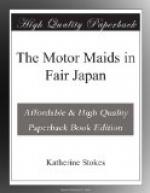“What a shame,” Billie exclaimed sympathetically. “I should think you would learn something, some trade, I mean, Onoye. You are much too clever to be a housemaid. But I suppose you will marry. I hear there are no old maids in Japan.”
Onoye shook her head and smiled sadly. Perhaps she did not understand Billie’s remark because she did not reply.
“Old maid, Onoye, is one who never marries,” explained Nancy at the dressing table arranging her hair.
“Ah, Komatsu old maid. He not marry.”
“No, no, Komatsu is a man,” said Billie trying not to laugh. “Old maid is a woman who has no husband, like Miss Campbell.”
“Old maid,” repeated Onoye, and because of what happened that very evening, it was evident that the retentive Japanese memory had not lost the words.
In the afternoon there came a characteristic note from Mr. Campbell to his cousin.
“Tell O’Haru to put on the big pot and the little,” it ran, “and to kill the fatted calf. I am going to cheer up my gloomy household by bringing four men home to dinner. If it were not for these flimsy little card houses, I would suggest a dance afterwards, but I couldn’t answer for the walls and roof if two young Americans danced a two-step in the parlor.”
“I am sure a two-step is no rougher than one of these storms of wind and rain,” observed Miss Campbell, feeling a sudden loyalty toward everything American, including dances.
O’Haru was informed of the party and the house became at once a beehive of activity. Several of the little maids, without being told, took down all the dresses in the wardrobes and began drying them out with square boxes of red embers.
“I’d like to be done the same way,” remarked Miss Campbell. “I think I am just as mildewed as my clothes.”
The kitchen quarters of the house fairly vibrated with the stir of preparation. In the living rooms the air was dried with small charcoal stoves. The gardener was seen bringing in armfuls of flowers; and with all the activity and preparation, there was no noise, not a sound. It was positively uncanny.
Late in the afternoon Nancy slipped away from this noiseless busy scene and tripped demurely down a garden path toward the bridge. She was not exactly bent on mischief but she wanted to satisfy her curiosity about something. The rain had lessened considerably but it was still necessary for her to protect her recently arranged curls with her small blue silk umbrella. In her mackintosh of changeable silk in two shades of blue, she made a charming picture coming down the rain-soaked path. The garden itself was a thing of beauty. On the end of every pine needle hung a crystal drop, and through the thin veil of mist clinging to the shrubbery a clump of azaleas glowed like a crimson flame. Taking a path to the left, Nancy began the gentle and almost imperceptible descent to the little bridge. The air was filled with the perfume of wild roses and late plum blossoms. It was really a fairy land, this Japan; a place too exquisite and unreal for human beings to live in. She began to sing softly to herself Elinor’s favorite song:




